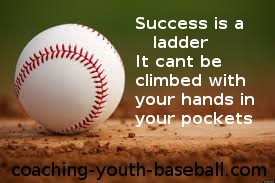Coaching Youth Baseball
Coaching youth baseball. The job that n the surface seems easy to identify… win baseball games, put the right players in the right positions, build team chemistry, and motivate the team to win.
How difficult building a championship caliber team may be? In a word , very. It’s very hard to coach youth baseball or any youth sport. Coaching youth baseball entails so much more than winning games and can be so more rewarding if done properly. When I began coaching, I made the mistake of thinking that I was just teaching how to play baseball. I was wrong, youth baseball coaches are also setting examples and teaching kids how to build a foundation to be successful in life. You will learn that during every practice, and every game you may have the distinct opportunity to make an impact on you players. We have put together a list of four ideas that would be great to keep at the top of your list when working with young minds on the baseball field.
 How would you like to suddenly be the most feared and respected coach or player in your league?
How would you like to suddenly be the most feared and respected coach or player in your league?
This became particularly clear to me over this past weekend when I received a text message from a parent. In the text it explained how the player was giving a speech in one of his classes and it was regarding the things that he had learned on the baseball field. It wasn’t about how to field a ground ball or how to hit for more power, it was about values he had learned that would help in life. I was blown away. I had made an impact on a young mans life.
Making a positive impacts on young players lives may be the most important job of a youth baseball. You see, players come from all different types of backgrounds on a baseball team. Broken homes, happy homes, wealthy, poor, etc. Baseball can be a safe haven for these players where they get to have fun, learn, and be a part of something special. Unfortunately for most players, special is not what they receive, especially in youth sports. Instead they receive bitter parents, overbearing coaches, and more politics than playing time.
The blame is not solely on the coaches in the community. Parents, rules, and regulations all play a part the baseball experience. I have even seen a player that was told he was too good to participate on a local sports team. Are you kidding me? Sad to say, but youth sports in many instances has become about politics instead of helping young kids establish positive attributes that can help them long after they are done playing the game.
Don’t get me wrong, I am all for protecting kids, but not at the expense of compromising the integrity of the game.
I heard an alarming statistic early on in my playing career. The average retirement age of baseball players is 12 years old. I want you to think about that for a second, 12 years old. Baseball is a game and meant to be a fun, enjoyable experience. My guess is that young players stop playing the game because they have had a bad experience, not because they don’t like to play the game. I am not placing blame on any one person, but what I am saying is that we need to do a better job of communicating with our players and be aware that we are in a position to make a huge impact on young minds.
Whether you are a baseball coach or a parent, you have this opportunity almost every single day and We have put together a list of four ideas that would be great to keep at the top of your list when working with young minds on the baseball field.
- Make sure every baseball player regardless of skills level has fun while they learn. Winning does not equal fun, it equals winning. I have seen countless kids not have fun on a winning team because they get pushed to the way side because of their skill level. Most skilled, least skilled, I don?t care. Each player deserves quality attention and the opportunity to get better, make sure that happens.
- Help players to understand that learning to be successful on the baseball field can give you a strong foundation to be successful in life. It is sad to say, but we forget that many players learn many virtues while a part of a sports team. Take myself for instance, baseball instilled integrity, determination, perseverance, and the understanding of what it means to be a part of a team. If you keep these life skills in the forefront of you mind, you will be amazed at how your coaching approach changes from winning a baseball game, to helping the kids understand what it takes to be successful and learning to persevere.
- Make every player accountable for their actions. If the best player on the team is late to practice, punish the team. If the least skilled player is late to practice, punish the team. No one player is subject to special treatment. I don?t care if it is a big game, sit players down if they have done something out of character. Players respect coaches who treat the team as a team. This will force your players to see the true value of the person next to them and care about each other as people and teammates.
- Players play the game, not the coach. Your role as a coach is to be a guide and a resource. Explain the reasons behind why situational baseball is important and what will put them in the best position to succeed on the diamond. Do not bunt a player out of situation because you dont feel he is skilled enough to get a hit. Open the lines of communication and make sure that if something is misunderstood, you take the time to explain it further before moving on.
Get more free youth baseball useful drills, tips and strategies – Youth Baseball Success
If you put these concepts into practice, Your approach to coaching will change, you will not only feel more successful..you will be more successful. If you want the best for you players, you will begin making an impact that will stay with your players for life. They will appreciate your commitment and will work harder to maximize their potential. At the end of the day, winning baseball games comes down to the coach’s ability to inspire his players to reach new heights.


